Start-ups to Print Houses for Martians and to Help Wheelchair Users Move around City
On March 15, 2017, HSE hosted the annual Start-up of the Year awards ceremony, organized by the HSE Business Incubator. Five projects featuring unique online and offline technologies won awards.
The Start-up of the Year prize has been awarded by HSE since 2008. Traditionally, the award expert council, which selects the finalists in various nominations, and the jury, which selects the winners, include people from technology firms, investment and venture funds.
Igor Agamirzian is a regular guest at the event. But while previously he attended the ceremony as CEO of the Russian Venture Company, this year he attended in his capacity as HSE Vice President. ‘We have a long track-record of cooperation with the HSE on entrepreneurship development, and today I’m happy to say that the team that formed at HSE has now become an important part of the innovation environment’, Igor Agamirzian said. ‘And this is by no means simply the ‘Moscow crowd’, it is an environment that includes young people from all across the country.’
‘We all live in one big competition – the marketplace. And this is where the real winner is announced’, the HSE Vice President added. ‘But contests for entrepreneurial projects also play an essential role, and many of these contests grow into something bigger, such as business accelerators.’
PepsiCo joined Raiffeisen Bank, Kaspersky Lab, and Microsoft as awards partners this year. ‘We believe it’s vital that Russia sets good examples for younger entrepreneurs, and those who have already achieved something,’ Nadezhda Roguleva, employer brand development manager at PepsiCo, said, explaining the company’s interest in the contest.
The Start-up of the Year award was given in five nominations. Four of them were selected by the jury – Global Start-up, Best Hardware Start-up, Best FinTech Start-up, and Best Socially Responsible Start-up. And the winners in one more nomination – People’s Choice – were selected by the ceremony guests and audience, including those who watched the broadcast in social media.
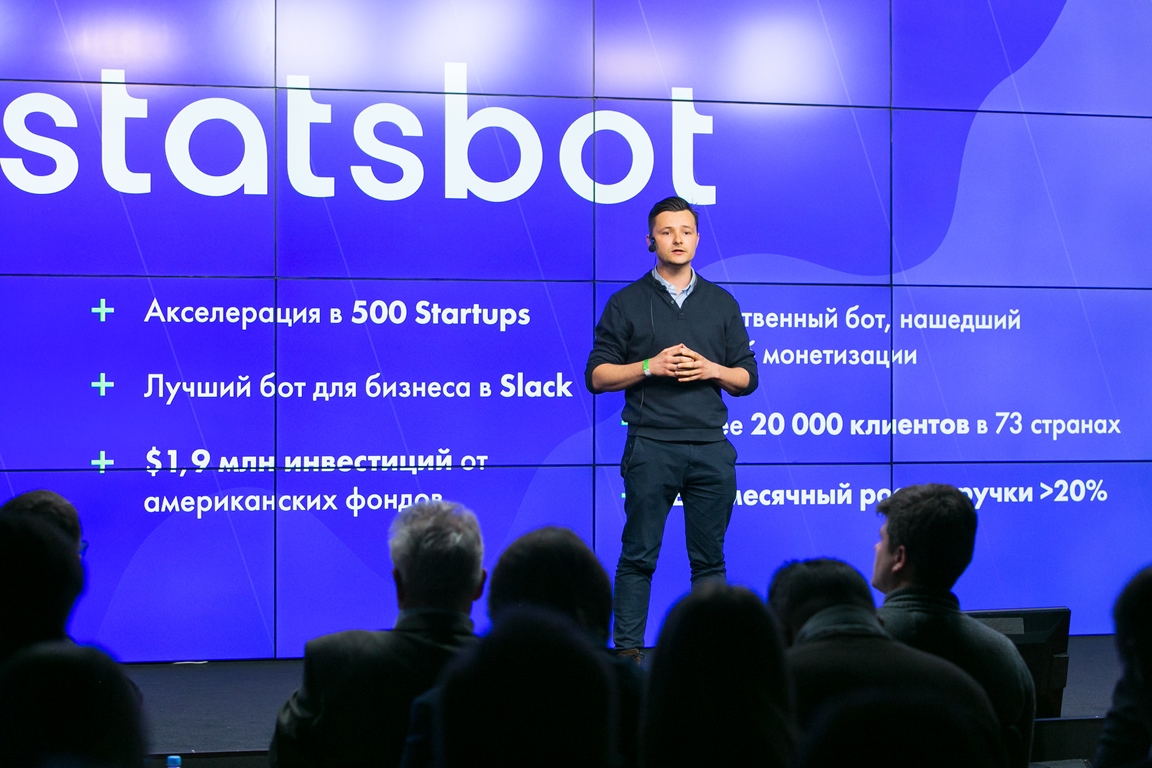
How to make money on communication and analytics
Statsbot, a smart business assistant for corporate messengers, was recognized the best Global Start-up.
‘In Summer 2015, my mornings started with uploading analytics to Slack (a popular corporate messenger) to discuss them with the team,’ said Artem Keidunov, co-founder of Statsbot. ‘I was fed up with that, and decided to automate the process. That’s how I came up with the idea of a smart business assistant. One and a half year later, Statsbot has been installed by 20,000 companies in 73 countries. We went through a well-known U.S. accelerator and raised over 1.5 million dollars from U.S. investors’.
Statsbot works at the intersection of marketing, artificial intelligence, and analytics. It’s not a simple bot. It sends automatic reports, notices abnormalities in the data, and predicts the metrics’ behavior. For example, Keidunov says, OVO Energy, a British power company, uses Statsbot to detect electricity meter installation problems. Users also include Walmart, Red Bull, eBay, and other big companies. Statsbot’s revenues grow 20% a month. ‘Statsbot is already changing the way companies work with analytics, and it’s only the beginning,’ Artem Keidunov says.
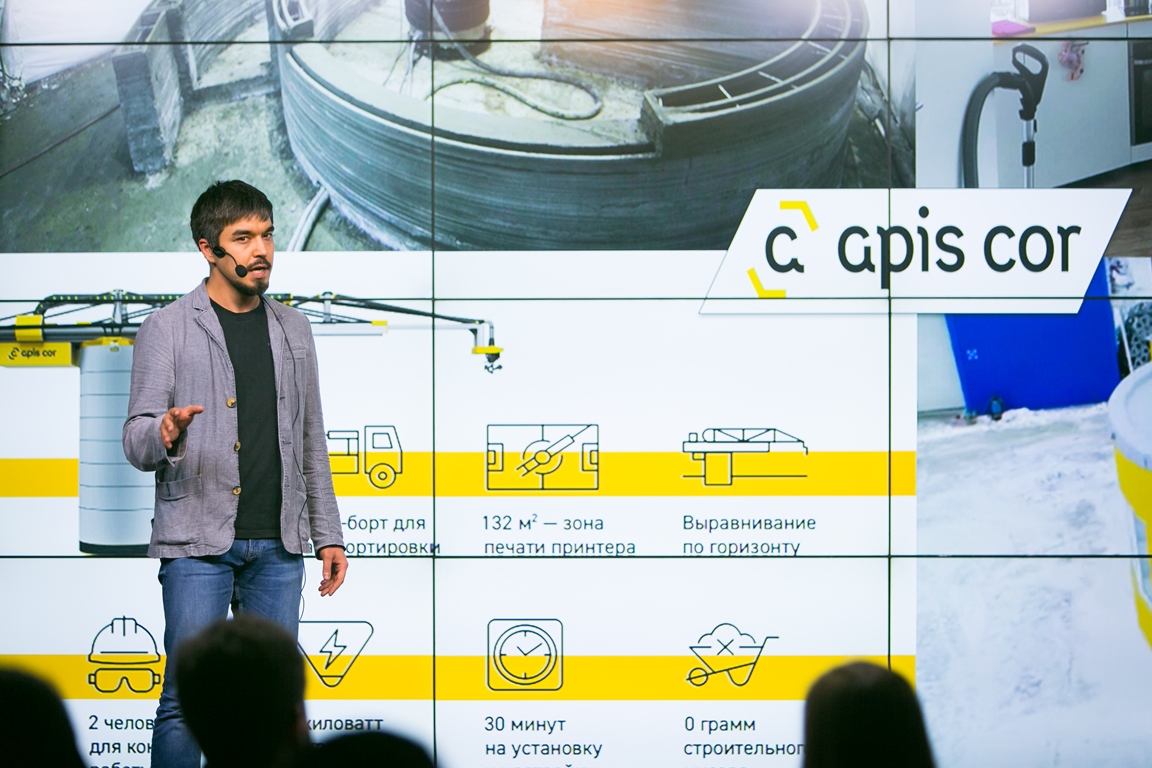
This is the house that we built
Apis Cor won Best Hardware Start-up. Apic Cor developed the world’s first mobile 3D printer for the construction industry, which can build a small house in 24 hours anywhere.
Apis Cor engineers say their technology cuts costs for constructing the building frame by 60-70%, decreases overall construction time, and slashed volume of construction waste to zero. Apis Cor is especially attractive for companies constructing low-rise buildings.
In December 2016, Apis Cor was the first in Russia to 3D print a house. It is 38 sq.m in area and is located in Stupino, Moscow region. A video about this project has been watched over 2 million times on YouTube, and over 70 million times on Mashable, a technology-focused media.
‘Every day, we get over 1,000 emails from people across the world who are interested in using our technology in their business’, said Konstantin Nefediev, Apis Cor representative. ‘We believe that this award will accelerate our entry onto construction sites both in Russia and globally. But this is not our ultimate goal; we want to be the first company to start building houses on Mars’.
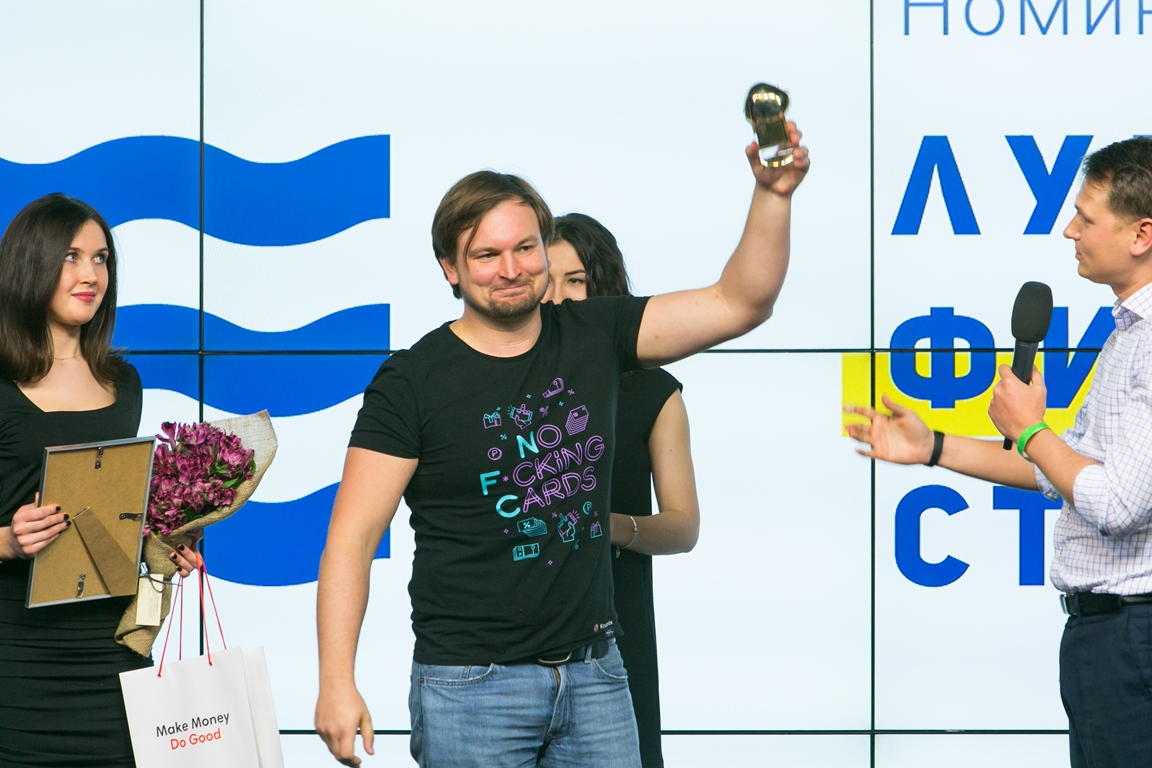
No more plastic cards!
Oleg Tretiak, head of the IT architecture department at Raiffeisen Bank, delivered a short talk before the Best FinTech Start-up Award was given. He mentioned that FinTech people and start-ups are often called ‘bank haters’ and ‘disruptors’, since they offer solutions that compete with traditional banking services. But Raiffeisen Bank actively cooperates with these projects, since ‘they highly value the cultural changes that they add to the rather conservative banking sector.’ ‘With your offbeat solutions, you make us think differently,’ Oleg Tretiak added.
The Koshelek (‘wallet’) app is a great example of this service, and it won the nomination. It is an aggregator of all types of cards, both bank and discount or loyalty cards, not only those issued by big retailers, but also by smaller companies. It has already become a pre-installed app on several brands of smartphones.
‘People have long tried to get rid of plastic cards, and we understood that all of them, even the most security-sensitive, can be put in a smartphone’, said Filip Shubin, operation director at CardsMobile (developer of Koshelek), ‘In early 2016 we launched a service that detects the loyalty card by photo, and our algorithms detect 150,000 types of cards in Russia only. By May, we made 1 million cards digital, and seven months later, over 10 million cards. Today, six out of ten largest loyalty programmes are our clients. In 2017, we and our partners are planning to replace 10% of all plastic cards in Russia’.
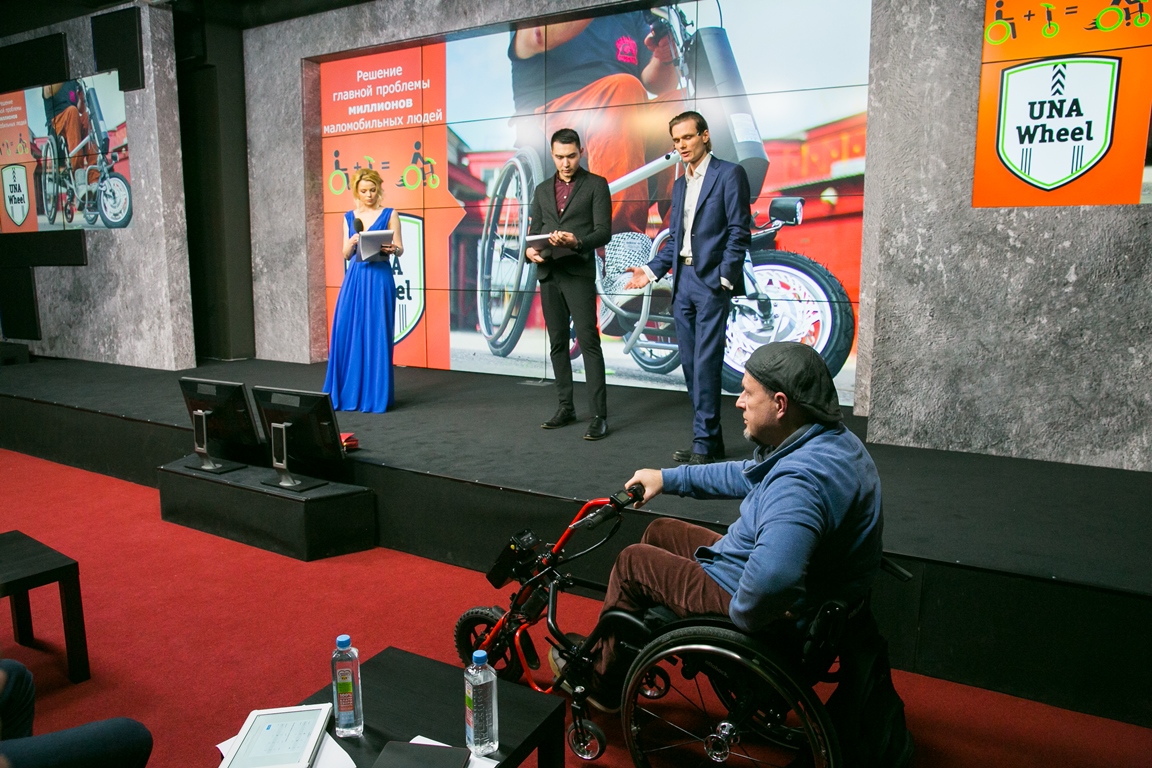
How to give way to people on wheelchairs
UNA was recognized as the Best Socially Responsible Start-up.
1.5 million people in Russia use wheelchairs. Or more accurately, this number could use wheelchairs, but in reality the number of active wheelchair users is smaller, since most wheelchairs are not adjusted for the reality of moving around in Russian cities. Even a 1-cm-high barrier can become unsurpassable for them, due to their small front wheels.
UNA Wheel, an electric extender for manual wheelchairs, is an enlarged front wheel with a handlebar and looks like a scooter. The extender can be charged from a simple socket, just like a smartphone, and one charge is enough to cover 25 km. It can take the wheelchair up a hill with a gradient of 25 degrees and deals effortlessly with small obstacles.
‘Investors are afraid of issues surrounding people with disabilities, they believe it’s too complicated an area’, said Nikolay Yudin, head of the UNA Wheel project. ‘We hope that this award will help us to change this view and demonstrate that there is a clear need for what we do, it’s social entrepreneurship, and we know how to make money. We have also launched a crowdfunding project aimed at making a lot of adapters that would allow our extender to be adjusted to any wheelchair in our country’.
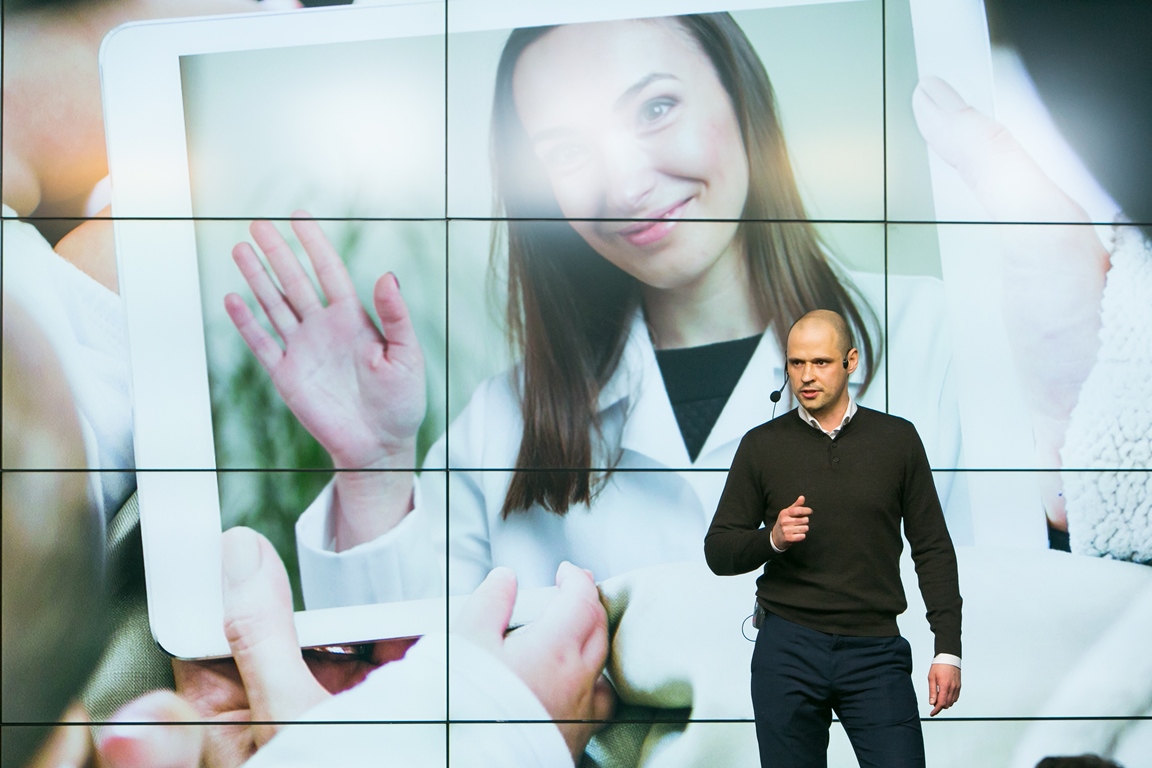
Helping you consult a doctor and avoid self-diagnosis
Almost 1,500 ceremony guests and online broadcast viewers voted for the winner in the People’s Choice nomination. They could vote for any of the projects participating in the contest, and the Pediatrician 24/7 project received the most votes (it was also nominated as a socially responsible start-up).
There are 160,000 settlements in Russia, and in many places residents don’t have the opportunity to quickly consult with a pediatrician. The alternative is talking to family, friends, or looking for the answers on often-controversial internet forums, which often do more bad than good.
Pediatrician 24/7 is an online consultation service that offers anyone anywhere the chance to get in touch with a qualified children’s doctor from Moscow or St. Petersburg within three minutes, rather than talking to anonymous internet users. ‘Every doctor on our website has a detailed profile showing their place of work and qualifications, so that any user can see the doctor’s areas of expertise before consulting with them’, said Denis Yudchits, head of the project. The Pediatrician 24/7 project has also been approved and supported by Leonid Roshal, renowned Russian pediatrician.
See also:
16 HSE University Students Win Student Start-Up Competition
The results of the first round of the Student Start-Up Competition were announced on July 5. The expert jury selected 650 winners from 2,300 submissions. Among the winners were 16 HSE University students, who will each receive 1 million roubles to develop their business projects.
HSE Startup Cup: How to Turn an Idea into an Operational Business
The HSE Business Incubator is calling for applications for the HSE Startup Cup for the third time. This is a competition of projects by HSE University students and employees, as well as students of the HSE Lyceum. Registration is open until April 29.
HSE University Students Present Their Start-Ups at Expocentre
Reklama 2021, the 28th international specialized expedition for advertising, was held at Expocentre from October 18–21 as part of the programme for Russia’s Year of Science and Technology. The HSE University stand at the exhibition showcased projects by students of the minor ‘Start-up from Scratch: Creating Your Own Business.’ The exhibition also included the signing of a cooperation agreement between the university and Expocentre AO.
‘Even if You’ve Launched Your Own Startup Once, You Begin to See Opportunities Everywhere and Stand More Firmly on Your Own Two Feet’
This year, the minor with the highest student enrollment at HSE University is the ‘Startup from Scratch: Creating Your own Business’, offered by the Department of Innovation Management. In September, 500 students from all four HSE’s campuses will begin studying the art of entrepreneurship. This number is less than half of the students who applied: in total, the minor course received more than 1,700 applications. Associate Professor Margarita Zobnina, who supervises the minor, spoke with the news service about why students from different faculties want to learn the secrets of a successful business, what skills they gain in the minor, and how they expand their professional networks.
‘If You Want to Create a Start-Up, This Minor Will Definitely Be Helpful’
On March 22, the enrolment period begins for the ‘Start-Up from Scratch’ minor, which is offered by the HSE Department of Innovation Management. The minor introduces students to different fields of entrepreneurship and guides them through the entire start-up process: from the development of an idea to entering the market with a product and attracting investors. 24 start-ups have made it to the stage of making their first sales. Below, HSE News Service talks about the most interesting student projects.
HSE University Is Creating a Community of Aspiring Entrepreneurs Among Students and Staff
The HSE Business Incubator has launched the HSE Startup Community to bring together HSE students and staff interested in entrepreneurship, and cooperation in developing their own projects. Participation in the community is free.
HSE Business Incubator Named the Best University Business Accelerator in the World
The HSE Business Incubator took 1st place in the 2019-2020 UBI Global World Ranking of University-Linked Business Accelerators. An awards ceremony for the top ranked institutions was held at the World Incubation Summit in Doha, Qatar on November 6.
‘Don’t Be Afraid to Try’: What You Can Learn at the HSE Business Incubator
The HSE Business Incubator works as a business accelerator, helping start-ups raise investment through a network of business angels, mentors and partners. The incubator is open not only to HSE students and graduates, but also for other startuppers. Below is some information on the programmes it offers, as well as about some common mistakes startuppers should try to avoid.
Winners of HSE{Business}Cup 2018 Announced
At the end of November, HSE’s Moscow campus hosted the finals of HSE{Business}Cup 2018 – a completion for student business projects. In total, six teams received grants equal to 200,000 roubles from HSE to make their ideas a reality.
Why Study after University: Continuing Education at HSE
In 2011, HSE graduate, Irina Demina, launched the startup ‘Button For Life’ (Ru: Кнопка жизни) - a round-the-clock service for elderly people and people with disabilities. Since 2016, Irina has graduated from three programmes offered by the Centre for Continuing Education at HSE’s Faculty of Computer Science and is planning to do more. Irina told the HSE news service about how the knowledge she acquired has helped her to reach new heights in business.


